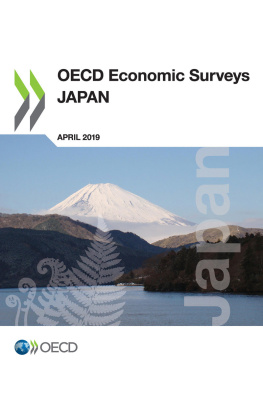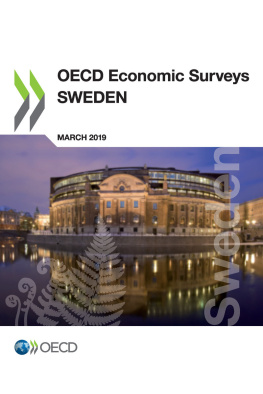OECD - OECD Economic Surveys: Japan 2019
Here you can read online OECD - OECD Economic Surveys: Japan 2019 full text of the book (entire story) in english for free. Download pdf and epub, get meaning, cover and reviews about this ebook. year: 2019, publisher: OECD Publishing, genre: Politics. Description of the work, (preface) as well as reviews are available. Best literature library LitArk.com created for fans of good reading and offers a wide selection of genres:
Romance novel
Science fiction
Adventure
Detective
Science
History
Home and family
Prose
Art
Politics
Computer
Non-fiction
Religion
Business
Children
Humor
Choose a favorite category and find really read worthwhile books. Enjoy immersion in the world of imagination, feel the emotions of the characters or learn something new for yourself, make an fascinating discovery.
OECD Economic Surveys: Japan 2019: summary, description and annotation
We offer to read an annotation, description, summary or preface (depends on what the author of the book "OECD Economic Surveys: Japan 2019" wrote himself). If you haven't found the necessary information about the book — write in the comments, we will try to find it.
OECD: author's other books
Who wrote OECD Economic Surveys: Japan 2019? Find out the surname, the name of the author of the book and a list of all author's works by series.
OECD Economic Surveys: Japan 2019 — read online for free the complete book (whole text) full work
Below is the text of the book, divided by pages. System saving the place of the last page read, allows you to conveniently read the book "OECD Economic Surveys: Japan 2019" online for free, without having to search again every time where you left off. Put a bookmark, and you can go to the page where you finished reading at any time.
Font size:
Interval:
Bookmark:

OECD (2019), OECD Economic Surveys: Japan 2019 , OECD Publishing, Paris, https://doi.org/10.1787/fd63f374-en .
This Survey is published on the responsibility of the Economic and Development Review Committee (EDRC) of the OECD, which is charged with the examination of the economic situation of member countries.
The economic situation and policies of Japan were reviewed by the Committee on 4 March 2019. The draft report was then revised in the light of the discussions and given final approval as the agreed report of the whole Committee on 2 April 2019.
The Secretariats draft report was prepared for the Committee by Randall S. Jones and Haruki Seitani, with contributions from Andrs Fuentes Hutfilter, under the supervision of Vincent Koen. Research assistance was provided by Lutcia Daniel and Secretarial assistance by Sisse Nielsen.
The previous Survey of Japan was issued in April 2017.
Basic Statistics of Japan, 2017 |
|---|
(Numbers in parentheses refer to the OECD average)* |
 |
Better Life Index: www.oecdbetterlifeindex.org |
* Where the OECD aggregate is not provided in the source database, a simple OECD average of latest available data is calculated where data exist for at least 29 member countries. |
a. 2016 data for Japan. |
Source: Calculations based on data extracted from the databases of the following organisations: OECD, International Energy Agency, World Bank, International Monetary Fund and Inter-Parliamentary Union. |
Growth has strengthened but Japan faces long-term challenges
Output growth is projected to continue at a moderate pace
Japan needs a detailed and concrete plan to ensure fiscal sustainability
Reducing obstacles to employment
Raising productivity is important to offset the impact of falling labour inputs
Boosting well-being by improving the environment and slowing climate change
Japans current economic expansion is its longest of the post-war era. The growth of output per capita has accelerated since 2012 to a rate close to the OECD area (Figure A), supported by the three arrows of Abenomics a bold monetary policy, flexible fiscal policy and structural reforms. Persistent deflation has ended and the government budget deficit has fallen from 8.3% of GDP in 2012 to 2.4%.

Source : OECD Economic Outlook database.
StatLink http://dx.doi.org/10.1787/888933953069
Japan faces the intertwined challenges of rapid population ageing and high government debt. Ageing is partly driven by long life expectancy. Half of the children born in Japan in 2007 are expected to live to the age of 107, which has major implications for the labour market. The number of elderly is projected to rise from 50% of the working-age population in 2015 to 79% by 2050, remaining the highest in the OECD (Figure B).
The increasing elderly population has driven a sharp rise in social spending since 1992. Twenty-seven consecutive years of budget deficits have driven gross government debt to 226% of GDP in 2018, the highest ever recorded in the OECD area. The government projects that population ageing will boost spending on health and long-term care by 4.7% of GDP by 2060. Measures to ensure the sustainability of Japans social insurance programmes, as spending rises and the number of working-age persons falls from 2.0 per elderly to 1.3 by 2050, is a priority.

Note: Population aged 65 and older as a share of the population aged 20 to 64.
Source : OECD Demography and Population database.
StatLink http://dx.doi.org/10.1787/888933953088
Output growth has slowed since 2017, reflecting weaker exports as world trade decelerated (Figure C). Still, output growth is expected to remain close to per cent through 2020, as shortages of labour and capacity, combined with record-high profits, continue to support business investment and wages. The temporary effect of the planned hike in the consumption tax rate from 8% to 10% in October 2019 will be less than after the 2014 tax hike thanks to offsetting fiscal measures.
Figure C. The economy is projected to grow around per cent a year in 2019 and 2020 | |||
|---|---|---|---|
2018 | 2019 | 2020 | |
Gross domestic product | 0.8 | 0.8 | 0.7 |
Private consumption | 0.4 | 0.6 | -0.1 |
Font size:
Interval:
Bookmark:
Similar books «OECD Economic Surveys: Japan 2019»
Look at similar books to OECD Economic Surveys: Japan 2019. We have selected literature similar in name and meaning in the hope of providing readers with more options to find new, interesting, not yet read works.
Discussion, reviews of the book OECD Economic Surveys: Japan 2019 and just readers' own opinions. Leave your comments, write what you think about the work, its meaning or the main characters. Specify what exactly you liked and what you didn't like, and why you think so.



















